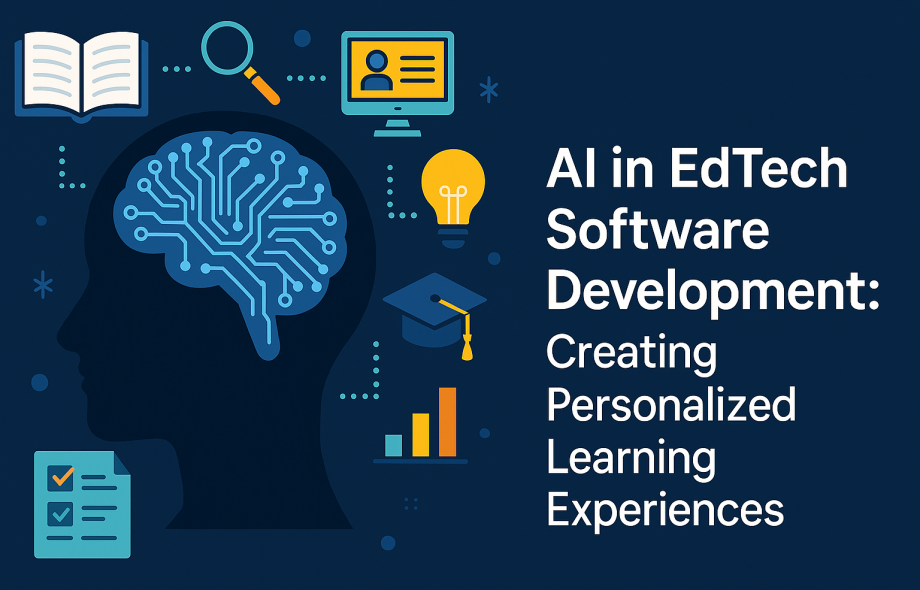Introduction
Artificial Intelligence (AI) has transformed various industries, including education technology (EdTech). With the integration of AI, EdTech software is now capable of providing personalized learning experiences that cater to individual students’ needs. This blog explores how AI is reshaping EdTech, its benefits, challenges, and future possibilities.
The Role of AI in EdTech
AI in EdTech enhances traditional learning methods by enabling data-driven decision-making and automation. It analyzes students’ learning patterns and adjusts educational content accordingly. AI-powered EdTech solutions assist educators and learners in several ways, including adaptive learning, automated grading, and real-time feedback.
Adaptive Learning Platforms
Adaptive learning systems use AI to adjust the content based on a student’s learning progress. These platforms analyze performance data to deliver customized lessons that match the learner’s pace and understanding level.
Automated Grading and Feedback
AI simplifies the assessment process by automatically grading multiple-choice questions and even evaluating short answers using natural language processing (NLP). This reduces educators’ workload and provides instant feedback to students.
Virtual Tutors and Chatbots
AI-driven chatbots and virtual tutors offer real-time assistance to students. These tools answer queries, explain concepts, and provide additional resources, improving the learning experience.
Benefits of AI in EdTech
AI-powered EdTech software provides several advantages for students, teachers, and institutions.
Personalized Learning
AI customizes educational content based on individual student needs. By analyzing learning patterns, AI helps create a unique study plan that enhances engagement and knowledge retention.
Improved Accessibility
AI tools, such as speech-to-text and text-to-speech applications, assist students with disabilities. These features ensure an inclusive learning environment where all students can participate equally.
Efficient Classroom Management
AI helps teachers manage classrooms effectively by tracking student performance, automating administrative tasks, and providing insights into learning behaviors.
Real-Time Analytics
EdTech platforms powered by AI generate real-time analytics that help educators make informed decisions. These insights enable early identification of struggling students and allow timely interventions.
Challenges in Implementing AI in EdTech
Despite its advantages, AI integration in EdTech comes with challenges.
Data Privacy and Security
AI-driven platforms collect and analyze vast amounts of student data. Ensuring the security and privacy of this data is crucial to prevent unauthorized access and misuse.
High Development Costs
Developing AI-powered EdTech solutions requires significant investment in technology and expertise. Many educational institutions and startups may struggle with the high costs associated with AI adoption.
Ethical Concerns
AI algorithms may sometimes exhibit bias, leading to unfair learning outcomes. Developers must ensure that AI models are trained on diverse datasets to maintain fairness and inclusivity.
AI Technologies Transforming EdTech
Several AI technologies contribute to the evolution of EdTech software.
Machine Learning (ML)
ML enables systems to learn from data and improve over time. It helps in predictive analysis, student performance tracking, and curriculum customization.
Natural Language Processing (NLP)
NLP enhances language-based learning applications, enabling features such as automated essay grading, speech recognition, and language translation.
Computer Vision
Computer vision technology is used in AI-powered proctoring systems that monitor students during online exams to prevent cheating.
AI and the Future of Personalized Learning
AI is expected to further enhance personalized learning in the coming years.
Intelligent Learning Assistants
Future AI assistants will be more advanced, offering deeper insights into student progress and suggesting tailored learning paths.
AI in Gamification
Gamification techniques integrated with AI will make learning more engaging. AI will analyze students’ engagement levels and adapt game-based learning strategies accordingly.
Integration with Augmented and Virtual Reality (AR/VR)
AI-driven AR/VR applications will provide immersive learning experiences, making complex concepts easier to understand.
AI in EdTech and Education App Development
AI-driven education app development is on the rise. Developers are incorporating AI to create apps that offer personalized learning paths, interactive study sessions, and real-time assessments. These apps cater to diverse learning styles and help students learn at their own pace.
The Impact of AI on Software Development Statistics
AI adoption in EdTech is influencing software development statistics, showing a steady rise in AI-driven applications. Reports indicate that AI-powered EdTech software is witnessing higher engagement rates and improved learning outcomes.
The Role of AI in EdTech Trends
AI plays a significant role in shaping EdTech trends, including microlearning, AI-driven analytics, and hybrid learning models. These trends indicate a shift towards more student-centric and data-driven education systems.
Conclusion
AI is revolutionizing EdTech software development by creating personalized learning experiences. From adaptive learning and automated grading to AI-powered tutors, the technology is making education more accessible and effective. However, challenges such as data security, development costs, and ethical concerns must be addressed to ensure responsible AI adoption. As AI continues to evolve, its role in EdTech will expand, offering more innovative and efficient learning solutions.
 :
https://in.pinterest.com/citrusbugtechnolabs/
:
https://in.pinterest.com/citrusbugtechnolabs/

